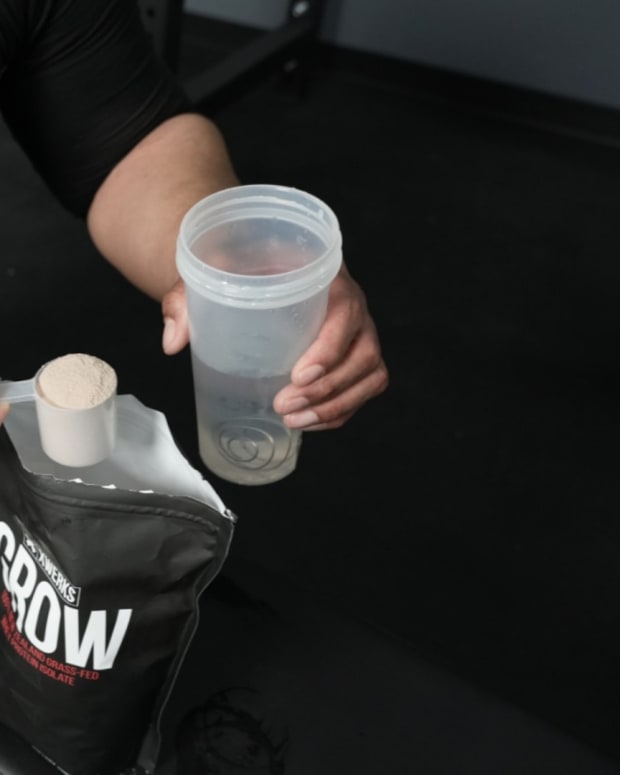The products featured in this article have been independently reviewed. When you buy something through the retail links on this page, we may earn commission at no cost to you, the reader. Sports Illustrated editorial staff are not involved in the creation of this content. Learn more here.
If you’re dedicated to your fitness practice, you understand the feeling of frustration when your routine is disrupted by illness. And there’s nothing more disrupting than the (literally) burning discomfort of a urinary tract infection, or UTI. That can be especially true if you require a taxing course of antibiotics to clear the UTI: According to the Centers for Disease Control, antibiotics can carry side effects like dizziness, rash and diarrhea.
If that scenario sounds entirely too familiar, you’re not alone. I asked Dr. Charlie Seltzer, a board-certified physician in obesity medicine and internal medicine, how he characterizes the frequency with which he sees UTIs. “Very, very common,” he tells Sports Illustrated Showcase. “So common that there's over-the-counter testing for it.” In fact, half of women are estimated to endure a UTI in their lifetime, and one out of five women are afflicted with the scourge of recurrent UTIs.
Fortunately, there are promising ways to proactively support urinary tract health and UTI symptom relief that go beyond the two practices women should always abide by at the toilet (namely, wiping front to back, and using the restroom after intercourse, Seltzer says). That preventative measure: supplementing with d-mannose, a natural sugar that comes neatly packaged in capsule and powdered form from brands like Uqora, among others.
Does it sound like you may be a prime candidate for the urinary tract support provided by Uqora? Read on to learn more about Uqora and d-mannose, including what the research says, what reviewers say and how much Uqora costs.
This content is meant to be informative, but should not be taken as medical advice. It is not intended for use as diagnosis, prevention or treatment of health problems. Always speak with your doctor before starting any new supplement or exercise regimen.
What Is Uqora?
Uqora supports UTI symptom relief and proactive urinary tract health. Specifically, Uqora is a supplement that comes in powdered or capsule form, depending on the product line.
The history of Uqora and why it launched is highly personal to founder Jenna Ryan: She suffered from frequent UTIs, and was determined to move the needle toward prevention and proactive urinary tract health rather than treatment after the fact. Ryan combined forces with her partner, Spencer Gordon, who had a background in molecular biology, to launch Uqora.
Although other ingredients may play roles as well, including vitamin C, vitamin B6 and magnesium, the active ingredient in Uqora that is most scientifically proven to prevent and combat UTIs is d-mannose.
"So d-mannose is a carbohydrate found in fruit. Monosaccharide is the fancy term. And it binds to bacteria,” Seltzer says.
Women have a more short, straight urethra, and are consequently more prone to the bacterial infiltration that causes UTIs. Or, put bluntly, bacteria from the outside gets inside, Seltzer says, causing the infection.
Most important toward UTI prevention, d-mannose binds to the E. coli bacteria. “The type of urinary tract infections that we're talking about—the common ones—those are all caused by bacteria, usually from E. coli,” Seltzer says.
When you ingest the d-mannose, rather than allowing the E.coli to collect in the urinary tract, you can safely be rid of the E. coli and d-mannose, bound together and expelled when you urinate. Easy peasy. No antibiotics needed.
Continued innovation in the treatment of UTIs is a steadfast goal for Uqora: According to the brand, clinical research and non-clinical development of solutions for non-antibiotic treatment and prevention of UTIs remains ongoing.
Uqora Products
Flush
What It’s For
Uqora Flush (formerly known as Uqora Target) is a powdered, pink lemonade-flavored drink mix that you can buy in individually wrapped packets of 10, 20 or 30. The packets, at a cost of roughly $2 a piece when you subscribe to recurring shipments, are designed to quickly and gently flush the urinary tract.
How To Take
The powder is added to water, and Uqora recommends drinking the mix every three days, and after intercourse. If you need extra support, the brand recommends drinking Flush every day.
Main Active Ingredient
The main active ingredient is d-mannose, which also accounts for the two grams of added sugar in Flush (the mix has 15 calories total).
Defend
What It’s For
According to Uqora, Defend promotes bladder wall health and flushes the urinary tract of harmful biofilm, or layers of bacteria that cling to surfaces.
How To Take
Defend is a twice-daily capsule taken with water. You can take Defend on its own, or as part of Uqora’s three-product lineup.
Main Active Ingredient
Key active ingredients in Defend include d-mannose, piperine (from black pepper powder) and green tea leaf extract.
Promote
What It’s For
Promote supports urinary tract health by encouraging the growth of healthy vaginal bacteria, Uqora says. For this reason, it’s the only Uqora product not recommended for men.
How To Take
Take one capsule daily on its own, or in combination with Uqora’s three-pronged system.
Main Active Ingredient
As a probiotic supplement, three types of “good” bacteria, or lactobacillus—acidophilus, rhamnosus and reuteri—comprise the active ingredients in Promote. The bacteria release acids that help balance the vaginal microbiome, Uqora says.
What We Love About Uqora
- Customer reviews overwhelmingly cite Uqora as the reason for the cessation of their previously frequent UTIs
- Subscribing to Uqora adds both convenience and cost-efficiency
- In addition to d-mannose, Uqora uses other evidence-based ingredients to supercharge its formula
- Reviewers on CVS.com gave the Flush pink lemonade drink powder 5 out of 5 stars for its taste
- Taking the complete Uqora regimen helps to both prevent UTIs and proactively foster more sound vaginal health
What We Don't Love About Uqora
- The product is pricey when you consider that you can get non-branded, generic versions of the same active ingredients for less
- Although clinical evidence is promising, scientific research into d-mannose is still in its fairly fledgling stages
Uqora Claims
The primary claim of Uqora is proactive urinary tract health support and UTI symptom relief by flushing the urinary tract of unhealthy bacteria and promoting healthy bacteria if you take the full Flush, Defend and Promote regimen. The claim is primarily backed by the research into d-mannose, a naturally occurring sugar that targets and flushes out the E. coli bacteria, the main culprit behind non-complicated UTIs. Clinical trials into d-mannose as both prevention and treatment of UTIs have boasted solid results thus far, and research is ongoing.
Quality of Ingredients
D-mannose
D-mannose, found in the Defend and Flush products, may already be familiar to those who suffer from UTIs. Seltzer says that although antibiotics are "still the mainstay" as far as treatment of UTIs, d-mannose “has some pretty good evidence behind it" both toward both UTI treatment and prevention. In one 2022 study published in the journal Antibiotics, researchers concluded that d-mannose was comparably effective to antibiotics in treating and relieving symptoms of UTIs. Researchers said larger studies could shed more insight on d-mannose and its usefulness.
The main risk Seltzer says of supplementing with d-mannose is exacerbating diabetes, and kidney damage, if you take too much.
Turmeric root extract
A centuries-old mainstay of Eastern medicine, turmeric is what accounts for Uqora Defend’s yellow hue. The effectiveness of curcumin, the active ingredient in turmeric root extract, toward cleansing biofilm, has been affirmed in preliminary laboratory research.
Piperine
Piperine, the active compound in black pepper, is there to support curcumin: Piperine ups the usually-poor bioavailability (or how well our bodies absorb the ingredient) of curcumin by 2,000 percent, Uqora says on its website, and studies seem to back the claim.
Green tea extract
Extracted from green tea leaves are micronutrients known as catechins, a compound known for its antioxidant properties. In combination with the curcumin from turmeric root, catechins have been shown to remove biofilm in early-stage laboratory research.
Uqora Cost
For the most subsidized cost, you can subscribe to Uqora’s full three-product bundle—you’ll get each product for a little under $20 a piece ($52 a month). Otherwise, here’s how the price breaks down per product:
Flush
The Flush powder comes in individually wrapped packets of 10, 20 and 30. You’ll pay less per packet when you buy more, and can also save 15 percent when you subscribe, which shakes out to about $2 per packet. The 10-pack without a subscription shakes out closer to $3 a packet, which is on the pricier side for a d-mannose supplement.
Defend
A one-month supply of Uqora Defend (60 capsules, taken twice daily) costs a reasonable $30, or $25.50 when you subscribe.
Promote
The probiotic Promote, which includes healthy bacteria like lactobacillus reuteri, is also $30 for a month supply, with savings of $4.50 a month when you subscribe.
When to See a Doctor
Unpleasant as they are, women who experience periodic UTIs don’t necessarily need to book the first available doctor’s appointment (men are another story—more on that later). “There are women who get frequent urinary tract infections, where the doctors will prescribe refills on their antibiotics, and they can self-treat at the first sign of symptoms,” Seltzer says.
However, Seltzer says that if you’re experiencing what you think may be your first UTI, see a primary care physician: “Especially in the beginning if you've never had a urinary tract infection, you should not attempt to diagnose and treat it yourself,” Seltzer says.
And if you’re looking into using a d-mannose supplement like Uqora long-term, you should also talk to a doctor first, Seltzer says: D-mannose can make diabetes worse, and taken in excess, can damage the kidneys.
“I think it's important if you're going to use d-mannose as a chronic preventive measure to talk to your doctor and just get your kidneys checked at the beginning, and then again after a couple weeks, just to make sure it's not hurting you,” Seltzer says.
You don’t need to see a kidney specialist, or nephrologist, specifically, but any primary care physician (internal medicine, family doctor) is equipped to consult, Seltzer says. However, there is a point at which Seltzer says he would suggest a patient see a urinary tract health specialist. “If you're a male and you get more than one, you should see a urologist,” Seltzer says. “So every male is entitled to one urinary tract infection in their life.”
Seltzer advises women who average more than one UTI a month to see a urologist or urogynecologist.
What Customers Are Saying About Uqora
There is substantial praise for Uqora. Among the more than 29,000 customer reviews left on the Uqora website, 88 percent of reviewers deemed the product a perfect 5 out of 5 stars. The prominent theme of the praise is Uqora’s effectiveness at doing exactly what it claims: Eliminating UTIs. “I tell everyone I know if you have frequent UTIs, then BUY THIS,” writes one reviewer, who after beginning the complete Uqora regimen, reported no UTIs in over eight months.
And every 5-star review almost universally reported likewise: Total elimination of UTIs after years of suffering from recurrent urinary tract infections. Writes another reviewer, “I got UTI after UTI to the point I would carry antibiotics with me in case symptoms started. I have not had a single UTI since starting Uqora! Absolutely life-changing.”
The main quibbles in negative reviews were customer-service related (receiving a canceled shipment, long wait for an order, etc.). However, customers bemoaning that the supplements outright didn’t provide UTI relief is a rare complaint. Fortunately, Uqora also has a 60-day money-back guarantee, which should be adequate time to weigh if Uqora is effective in curbing your frequent UTIs.
Uqora vs Wisp
It’s no surprise that Uqora isn’t the only game in town when it comes to tackling UTI symptoms, considering how commonplace they are. The brand Wisp also furnishes a daily probiotic supplement and d-mannose supplement, both geared toward UTI prevention. However, Wisp overall as a service is more akin to telehealth than a mere subscription supplement purveyor. Wisp covers a broader array of women’s health topics, and provides the option to privately message physicians for prescription medications.
Uqora vs HUM
HUM Nutrition is a personalized vitamin service with a Private Party supplement to promote UTI prevention. HUM’s formulation includes prebiotics, however, the formula also instead relies on cranberry as a preventative ingredient, rather than the more proven supplementation of d-mannose: Unlike d-mannose, research does not support cranberry as having comparable effectiveness as antibiotics to prevent UTIs.
Uqora FAQs
Is Uqora a legitimate company?
Uqora’s claims may sound too good to be true, but indeed, Uqora is a legitimate company with products whose ingredients are “generally recognized as safe” by the FDA. Uqora has been on the market since 2017, with headquarters in San Diego, CA.
Does Uqora work?
Research into d-mannose is ongoing, but it’s one of the most promising alternatives to antibiotics as far as UTI prevention and treatment alike, although Uqora does not claim to treat UTIs. Uqora however may not “work” for everyone, especially when you account for the fact that d-mannose only targets the roughly 80 percent of UTIs caused by the E.coli bacteria.
Why is Uqora not FDA approved?
As a dietary supplement, Uqora products fall into a regulatory gray area. So while the product is not technically approved by the Food and Drug Administration, the FDA does classify the supplement’s ingredients as GRAS, or “generally recognized as safe.”
Where can you buy Uqora?
You can buy Uqora directly from the brand at Uqora.com, although Uqora also launched in-store buying options via the drugstore CVS in 2023.
Can Uqora get rid of a UTI?
Uqora, which was developed with the help of urologists and physicians, is not designed to treat or get rid of UTIs, but rather, to maintain urinary tract health and support UTI symptom relief.
Does Uqora affect the kidneys?
According to Uqora, there are no known side effects, including kidney damage, for the ingredients at their manufactured doses. Be extremely wary to read labels and take proper amounts, as d-mannose can damage the kidneys when over-ingested, according to Seltzer.
Takeaway: Is Uqora Worth It?
I can work myself into a pretty enraged tizzy just trying to imagine all the time and potential that’s been wasted because of UTIs: Treks to the doctor, to the pharmacy for antibiotics and all the usurped pantry space with cases of cranberry juice that would probably better serve you as mixer in a non-alcoholic cocktail than as a UTI remedy. The minimal risks and overwhelmingly positive feedback on Uqora.com from frequent UTI sufferers therefore lead me to conclude that it’s a no-brainer to try if you’re among the one in five women who are all too familiar with frequent UTIs. Having said that, always consult a healthcare professional before embarking on a lifestyle change, and that includes introducing a dietary supplement like Uqora to your routine.
That’s especially true because of the unique space health supplements occupy in the consumer market: Although the products make bold claims, they aren’t FDA-regulated. So it’s all the more vital to consult your physician about any and all supplements you take.
These statements have not been evaluated by the Food and Drug Administration. This product is not intended to diagnose, treat, cure, or prevent any diseases.
Prices are accurate and items in stock as of publish time.














